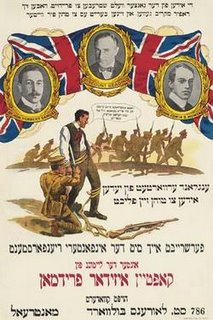“Sorry I kept you waiting. And you had to endure this clown...” he muttered, referring to the actor playing a Canadian soldier, who was marching some 7 year old kids up and down the large museum court. “As I said on the phone our poster collection is rather weak on Palestine, but by all means have a look, see what you can find. We would like to purchase more but our annual purchase budget... I can’t tell you how much it is, but it’s less than a round of drinks. You get my point.”
 He was right, nothing was directly relevant. But I found a World War I British recruitment poster in Yiddish. A soldier can be seen cutting the ties of a Jew, who is quoted saying ‘England made me free, now I will pay my debt’. ‘Join the Infantry Reinforcment!’ England set the Jews free? well, in early 20th century, anti-Semitism was probably less a problem in the UK than in most parts of Europe, and some Jews rose to prominent position in Britain’s ruling class, as celebrated in the poster, showing the faces of Hebert Samuel (Home Secretary), Edwin Montegue (Secretary for India) and Rufus Isaacs (Lord Chief Justice); but the first immigration law, the ‘Alien Act’, was passed in the UK to prevent East European Jews fleeing to London from the pogroms and misery of Tsarist Russia. The same Tsarist Russia, where anti-Semitism was an official State policy, was Britain’s ally in the war.
He was right, nothing was directly relevant. But I found a World War I British recruitment poster in Yiddish. A soldier can be seen cutting the ties of a Jew, who is quoted saying ‘England made me free, now I will pay my debt’. ‘Join the Infantry Reinforcment!’ England set the Jews free? well, in early 20th century, anti-Semitism was probably less a problem in the UK than in most parts of Europe, and some Jews rose to prominent position in Britain’s ruling class, as celebrated in the poster, showing the faces of Hebert Samuel (Home Secretary), Edwin Montegue (Secretary for India) and Rufus Isaacs (Lord Chief Justice); but the first immigration law, the ‘Alien Act’, was passed in the UK to prevent East European Jews fleeing to London from the pogroms and misery of Tsarist Russia. The same Tsarist Russia, where anti-Semitism was an official State policy, was Britain’s ally in the war.
[The poster is probably pre Balfour declaration, Zionist sentiments are not used here]
Later I had a look at the contemporary section. Strange, uneasy mixture: I found the ‘No War on Iraq’ fliers and posters for the 15/2/2003 anti-War demo, right next to coalition propaganda fliers in Arabic for the Iraqi people, promising a new Iraq of 'progress, education, liberty, stability, security, rule of law, prosperty, democracy, and justice'.
The logo was especially disturbing: the occupying forces chose the image of a handshake – between an Iraqi hand (dark skinned, under an Iraqi flag) and a white hand, beneath the acronyms of MND (Multi-NAtional something) / South East. Of course, no American or British flags were shown on the poster – after all, this was a ‘Coalition War’, not a US/UK invasion.
The need to mask Imperial power is not new in the Middle East. When they captured Jerusalem, in 1917, the British were very careful not to display Union Jack flags, and not to use the King’s image on stamps and banknotes - unlike in African colonies, for example. The British knew the Middle East requires a more sophisticated approach.
But this 21st century propaganda had nothing sophisticated about it. It was as lame as this whole neo-conservative adventure-horror trip. Hiding behind meaningless acronyms, or a logo of a ‘handshake’, can't really fool anyone.
 He was right, nothing was directly relevant. But I found a World War I British recruitment poster in Yiddish. A soldier can be seen cutting the ties of a Jew, who is quoted saying ‘
He was right, nothing was directly relevant. But I found a World War I British recruitment poster in Yiddish. A soldier can be seen cutting the ties of a Jew, who is quoted saying ‘


No comments:
Post a Comment